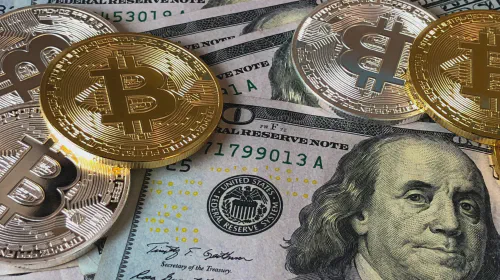What Is Bitcoin and What Is It Used For?
Salomon Kisters
Nov 10, 2022This post may contain affiliate links. If you use these links to buy something we may earn a commission. Thanks!
Bitcoin is a digital currency that is used to buy goods and services over the internet without the need for a financial intermediary between the buyer and the seller.
Bitcoin transactions are recorded on a decentralized ledger that is managed on a computer network. The ledger is updated autonomously and requires computers controlled by human operators to operate and connect to.
Since its launch in 2009 by Satoshi Nakamoto, Bitcoin has changed the world of online finance by allowing users to bypass banks and other financial institutions. It has several uses, which we will cover in this article.
How does Bitcoin work?
Currency unit
Bitcoin is a digital token that is issued by the Bitcoin network. The symbol for Bitcoin is BTC or XBT. It is also represented by the ‘₿’ symbol. It can be divided into 100 million satoshis, the lower denomination of the currency.
Information about Bitcoins is stored on a decentralized ledger. This includes the token transaction history and digital address identifiers, among other data.
Blockchain
The Bitcoin network is a decentralized network of computers that operates the Bitcoin ledger. Each computer connected to the network (a node) carries a part of the transaction database (the ledger), and some nodes may have the complete dataset.
The ledger itself is operated on a type of database called a blockchain. Transaction data in blockchains are stored in ‘blocks’ linked together by timestamps.
The network chains several blocks together while recording new transactions over time. In the Bitcoin network, each transaction is encoded using cryptographic techniques. Data encryption keeps data relatively secure from hackers.
Mining
As the Bitcoin network works independently, it is dependent on the work done by the network nodes to complete a transaction. Each computer has to locate the addresses of a Bitcoin transaction on the ledger by solving cryptographic puzzles. The process is called mining.
In simple terms, it is looking for a number called an SHA-256 value to add it to a corresponding block in the blockchain. Before adding a transaction, at least 3 nodes have to approve the transaction.
As more transactions accumulate, there is a need to add a new block. A node that successfully adds a new block is rewarded a fixed amount of Bitcoins. This algorithmic scheme is called ‘Proof-of Work’ (PoW). PoW algorithms favor computers with high processing power that can perform many cryptographic operations per second, allowing them to approve transactions more frequently.
The overall supply of Bitcoins is limited to 21 million coins. While most of the coins have been mined, the remaining coins are expected to be fully mined in 2140.
Ownership and Storage
Bitcoin tokens are linked to a pair of addresses controlled by a user.
A public address that everyone can view on the blockchain (think of it like an email address).
A private address that is only viewable to the owner of the public address (think of this like a password needed to verify a transaction on this address).
To send or receive Bitcoins both addresses need to be used. While a public address is fixed, a private user address is generated in a way that makes it difficult to recreate it through another computer.
The private address is needed to verify ownership of a specific Bitcoin token on the network. Therefore, any user needs to keep this in a safe location.
Advantages of Bitcoin
Since Bitcoin is a decentralized currency, it offers several advantages for users over traditional money.
Financial Independence
Bitcoin allows people to bypass banks and financial institutions subject to government regulations. Therefore, Bitcoin becomes a gateway for online transactions in regions where banking rules and regulations are very restrictive.
Bitcoin is especially invaluable for persons and businesses that have difficulty accessing international currencies.
Transparency
Bitcoin technology, including the ledger, is open source. Anyone can view the Bitcoin ledger to see transaction history or confirm a pending transaction.
Security
The decentralized network can keep a persistent record of the blockchain network. If one computer leaves the network or gets compromised, other computers can continue verifying and recording the transaction. Cryptographic processes also deter hackers from easily accessing transaction information.
Anonymity
Addresses on the blockchain are not associated with usernames. So transaction information does not directly reveal the parties involved. However, it’s worth noting that anyone can make their list to keep a record of suspicious bitcoin users.
Disadvantages of Bitcoin
Power Consumption
The bitcoin network is notorious for its high power usage. Studies have shown that it consumes up to 100TWh of annual electricity. This is equivalent to the electricity consumption of countries like Egypt and Ukraine. If the power is equated to fossil fuel usage, it has a high carbon footprint.
Susceptibility to hackers
Hackers have started using more sophisticated techniques to breach the Bitcoin network. While there have been upgrades in recent years, users using legacy systems risk losing all of their digital holdings on the blockchain.
Legality and Lack of Mainstream Acceptance
Bitcoin’s market value is highly volatile. For every person getting rich through Bitcoin investing, several people have lost their savings or fallen prey to Bitcoin scams on peer-to-peer trading networks.
Governments advise cryptocurrency traders to be careful when buying them. Countries like China and Pakistan have made it illegal to use cryptocurrency.
Additionally, Bitcoin has a long way to go toward mainstream adoption in many countries. Factors include a lack of awareness about Bitcoin and how to access it, low penetration rates of digital banking, and an unwillingness to buy Bitcoin because of market risks (scams and speculative trading).
What is Bitcoin Used For
To Buy Stuff
Bitcoin is simply another way to buy things on the internet. One of the first things purchased by Bitcoin in the real world was a Papa John’s Pizza worth 10,000 BTC! ($41 at that time).
Since then people have been buying many things through bitcoins like fast food (online deliveries), entertainment services, groceries, digital media, property, and much more. Here’s a list of places that accept Bitcoin in case you are curious.
Donations
Internet information and knowledge advocacy organizations like the Wikimedia Foundation, Electronic Freedom Fund, and the Internet Archive have been accepting Bitcoin for some time.
Other organizations include charities such as UNICEF and the Rainforest Foundation. So Bitcoin is now a way to help others make the world a better place.
Investing
When Bitcoin’s price started to soar (ultimately reaching a record high in November 2021), many cryptocurrency enthusiasts flocked to stash their currency holdings on the blockchain. Of course, these things never last, and the price crashed. So there is some risk in crypto investing.
That has not stopped many from trying their hand at making a fortune.
New blockchains like Ethereum and Solana allow DeFI investing and staking options that represent an alternative route to minimize risks.
However, you should always be careful before investing in any cryptocurrency.
Buying Other Cryptocurrencies
Today, many crypto exchanges trade several cryptocurrency pairs or allow withdrawals in Fiat currencies. Bitcoin is 100% guaranteed to be one of the primary cryptocurrencies featured in crypto exchanges.
So if you are shopping for some altcoins, you can use Bitcoins to buy some for yourself. Make sure you research the type of cryptocurrency and the transaction fees of the exchange you are buying.
Gambling
Yes, you read that right. Bitcoin casinos are a thing. Once again, we don’t recommend gambling. But this is where some folks prefer to spend their bitcoins.
Illegal Stuff
Unfortunately, Bitcoin’s anonymity and decentralized mechanism have allowed criminals to take advantage of it, tarnishing its reputation in mainstream media.
Transactions can be used to launder money or buy illegal items and services without the interference of banks. Their activity has created an online space called the dark web where they can operate almost undetected.
On a positive note, governments and law enforcement agencies have been working hard to track malicious agents using Bitcoin. Bitcoin’s transparency is useful in identifying addresses associated with criminal activity.
Final thoughts
Bitcoin is a radical departure from traditional online payment systems as it gives people unprecedented levels of freedom.
Although it has yet to go mainstream in many regions, people and businesses are steadily entering the Bitcoin fold. It is being used in many ways, and it’s here to stay, for better or worse. Perhaps you have already started using it, too.
If you are looking for creative ways to use blockchain technology for your business, consider partnering with Originstamp. Our team will guide you from the concept phase to a successful implementation and successful outcomes. Contact us today for a free consultation.
Stay informed with the latest insights in Crypto, Blockchain, and Cyber-Security! Subscribe to our newsletter now to receive exclusive updates, expert analyses, and current developments directly to your inbox. Don't miss the opportunity to expand your knowledge and stay up-to-date.
Love what you're reading? Subscribe for top stories in Crypto, Blockchain, and Cyber-Security. Stay informed with exclusive updates.
Please note that the Content may have been generated with the Help of AI. The editorial content of OriginStamp AG does not constitute a recommendation for investment or purchase advice. In principle, an investment can also lead to a total loss. Therefore, please seek advice before making an investment decision.

Do Any Governments Own Bitcoin?
Around 8% of all the Bitcoin in the world is owned by governments and companies. Let's have a look.

Why Can There Only Be 21 Million Bitcoins? Impact of Bitcoin's Fixed Supply
Discover why there can only be 21 million Bitcoins and the impact of Bitcoin's fixed supply on inflation control and scarcity.

Why Do Hackers Use Bitcoin?
Bitcoin is the preferred currency of hackers and scammers all over the world. Why is that?
Protect your documents
Your gateway to unforgeable data. Imprint the authenticity of your information with our blockchain timestamp